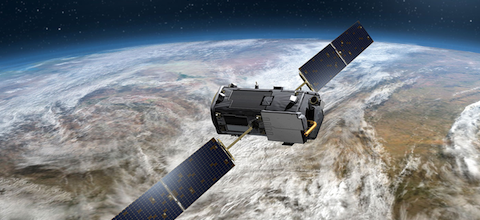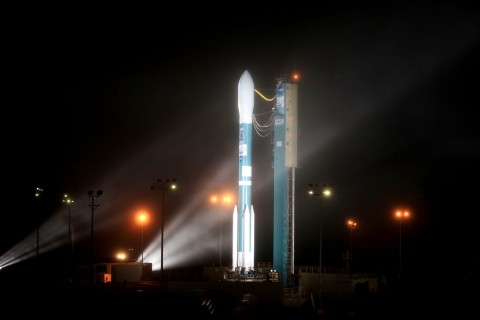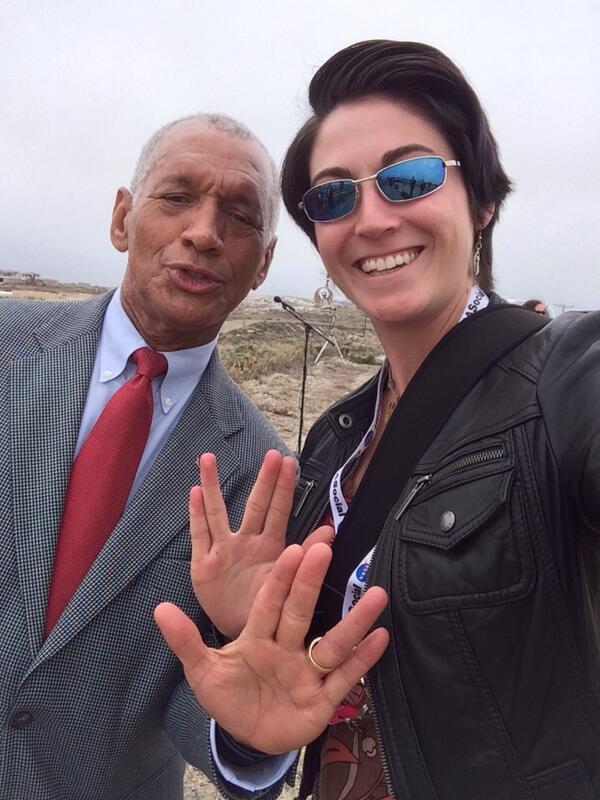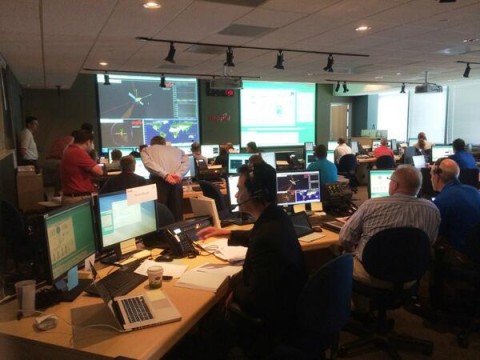
With the launch of the Orbiting Carbon Observatory (or or OCO-2), NASA has taken the first step towards the kind of ‘Treknology’ we are used to seeing in our favorite fictional future. TrekMovie was at the launch as part of a NASA Social event, plus we were lucky enough to catch an inspiring speech from NASA Administrator (and possibly Trekkie?) Charlie Bolden. Details below

OCO-2 sits on the launchpad at Vandenberg Air Force Base – ready to leave the planet
Who cares about carbon?
"Mr. Sulu, run an atmospheric analysis." It’s something that doesn’t sound at all out of place in an episode of Star Trek (In fact, that’s a quote from “That Which Survives“). 23rd century technology allows for a detailed atmospheric scan at the push of a tricorder button or at the launch of a Class 3 probe. With the launch of OCO-2, NASA now has its own atmospheric carbon probe circling the Earth.
Everyone’s got their eye on carbon dioxide (CO2); the little molecule that could. It only makes up 0.04% (400 parts per million) of Earth’s atmosphere, but tiny fluctuations in the trace gas can strongly influence plant and animal life on any planet. Planetary atmospheres are complex things, especially on Earth where the all-important carbon is constantly changing forms: it moves between the air, plants, animals, oceans, and rocks. Without a measure of how much carbon hides away in each of these different reservoirs and how carbon moves from one place to another, it is difficult to understand the geological, atmospheric, and anthropogenic (that’s human-caused) processes that control the movement and storage of carbon, arguably the most important element within all known life (save the Horta).
Why the OCO-2 satellite is such a big deal for science
The Orbiting Carbon Observatory, launched just two weeks ago from California, is now the first satellite to monitor atmospheric carbon dioxide from orbit (read: NASA’s first atmospheric CO2 probe!). The probe, which is about the size of the TARDIS, is still undergoing tests and orbital maneuvers to work its way into an optimal orbit. The data it will collect is extremely precise; the instruments aboard have a detection limit of 1 part per million. That means it can detect one-ten-thousandth of a percent of carbon dioxide in the atmosphere. Can any of Starfleet’s probes do that?
High tensions on launch day
Like with all great space science there is an element of risk involved. The OCO-2 is indeed already safely in orbit around our planet, but, scientists and engineers who have spent the better part of a decade working on this project were rightfully holding their breaths on the night of the launch, perhaps more so than for other launches, given OCO’s history. Notice the number “2”? OCO-2 is not the first of it’s kind, but it is the first to make it into orbit. On February 4th, 2009, the first satellite to carry the name OCO lifted off aboard a Taurus rocket, but when the rocket’s fairings failed to separate as planned, the entire payload was unable to reach its orbit and plummeted back to Earth.
So there was quite a sense of relief after the OCO-2 spacecraft was succesfully deployed, as noted by team lead Annmarie Eldering who was live tweeting the launch…
Fairing off – whew!
— Annmarie Eldering (@Eldering_CO2) July 2, 2014
Here is a video compiled by NASA Social attendee Jeff Sullivan showing the successful launch.
NASA Administrator Charlie Bolden drops in for a visit — is he a Trekkie?

TrekMovie’s Kayla Iacovino and NASA Administrator Charlie Bolden take a vulcan selfie.
As TrekMovie has previously reported, President Barack Obama is a bit of a Trekkie, so it is no surprise that his NASA Administrator also knows his way around a Vulcan hand salute. While he didn’t come right out and say it, the speech Mr. Bolden gave to NASA Social attendees at Vandenberg Air Force Base this month embodied many of the themes Trek fans hold most dear…
We owe it to people to continue to advance and we owe it to this nation to continue to reach way beyond where we can see right now. I use that in reference to exploring and frontiering and the like.
Mr. Bolden spoke about social media, NASA’s role in Earth Science, his experience as an astronaut, and the human race’s aspirations for Mars.
My vision, my belief is when we finally send humans to Mars in the 2030s, the first astronaut is not going to go down there and start building stuff and move in because by then, we will have started to use robotic precursors to do construction of habitats and the like. We’re smart enough to do that…
I don’t talk about exploring anymore, I talk about pioneering. Where people will go with the intent of staying. It may not be someone goes there and lives and dies there, although that may very well (happen), somebody may decide they want to do that. It means that humanity will go there, put up permanent habitats and stay there.
When asked why we should focus on colonizing Mars when we’ve done such a poor job here on Earth, Mr. Bolden had this to say:
Ahh, I think we’ve done pretty well with Earth. We didn’t do great, but it’s the best planet I know of.
You know you look around and you say yeah do we do bad stuff, are we not good stewards of Earth? In many cases yes we are. I think a large percentage of the population really works very hard to try to be good stewards of this planet. One of the reasons I think it’s important to try to get as many people as possible to see the planet from the perspective that I had (in space), when your looking back on it and you see how beautiful it is, it turns a non-believer into a believer (and) a non environmentalist into an environmentalist pretty quick.
As beautiful as the planet looks (from space) there is still no question about the damage that has been done. When you look at something like the Aral Sea or Lake Chad which is almost non-existent today, because all the water has evaporated over time, those are some things that ideally, we had something to do with and so, I think it’s important for us to go do this (pointing to OCO2 rocket). Hopefully we will be better stewards of another planet than we were here.
At some point, not in your life or my life, because we’re not going to live that long, but at some point in the future of the species, we’re not going to be able to live on this planet. In fact we’re not going to be able to live in the solar system because it will go away. Our sun is like every other star, it’s dying.
Read the entire discussion here. Huge thanks to Rodmoose for the transcript.
OCO-2: Where is she now?
Currently, OCO-2 is still going through the orbital motions to position herself into the proper orbit. Soon, OCO-2 will join five other Earth observing satellites that make up the “A-train” satellite constellation.

OCO-2 now part of NASA’s A-train of Earth observing satellites
For now, scientists and engineers are watching OCO-2 from the Mission Operation Center at Orbital Sciences Dulles, Virginia. Once in operation it will be providing data to anyone who cares to use it. As always, the NASA research data will be freely available online. That means that very soon, thanks to OCO-2 and the other Earth observing satellites in the A-train, scientists will be calling up NASA’s modern-day Sulus and requesting those atmospheric readings on our little Class-M planet.
You can follow along on twitter @IamOCO2 and with JPL’s After Launch Blog.

Mission Operation Center in Virginia, where OCO-2 telemetry is streaming in

All the better to see us with, eh?
Lucky!!!
Yeah, I guess the only good thing NASA is good for these days is “sigh-seeing” via probes. Let me know when this once fine organization has returned the “human equation” back into its operations. Until then, adieu…
@dswynne – I am disappointed by that attitude. While manned space flight does and should remain a priority for NASA, so is SCIENCE. Understanding our planet is so important for understanding our place in the universe. That goes for non-Earth-observing missions as well. Without the Hubble we wouldn’t be so excited about looking for life on Europa (the Hubble discovered it’s H2O plumes). Without Cassini, we wouldn’t know about the water spewing from Enceladus’s “tiger stripes”. Without Mars missions, we would have NO chance of being able to send men to the Red Planet safely. Without the solar observing missions, we would have a poor understanding of solar activity cycles and how they affect space weather. Heck, without GPS, a US satellite constellation, you couldn’t find your way around the surface of this planet! To call a scientific satellite like OCO-2 “sight seeing” is completely off base. It is an extremely intricate scientific instrument that is taking data that are vital to understanding the balance of ecosystems here on Earth. I’d say that’s pretty damned important.
This is important, and I fully support it.
I’m just wondering if and how this is going to help in the battle against climate change, which at this point is mainly a political battle.
OCO-2 will be a valuable tool for monitoring progress or the lack thereof with respect to CO2 pollution. But, given the persistent culture of denial within the party presently controlling Congress, this mission seems a bit like keeping count of the deck-chair inventory aboard the sinking Titanic. And I don’t imagine that Administrator Bolden wants or has the go-ahead to “politicize” this mission or NASA in general by framing the forthcoming satellite data as a corollary of the overwhelming, global scientific conclusion that the increasing CO2 is attributable to human activity.
I guess what I’m getting at is that it’s all very frustrating.
Good article though, and your roving reporting is much appreciated.
Cool that you got to get right in there, Kayla.
Nice report. Are you sending out versions of this to the syndication services? You should.
3. dswynne
FYI, NASA is going to launch the Orion space capsule on an unmanned test flight this December. Orion will be the first Interplanetary human spacecraft so NASA will soon be launching humans to beyond earth orbit.
Kayla – Excellent report!! I’d like to see more reports like that on Trekmovie.
@4 (Kayla Iacovino): I’m sorry that you are “disappointed” in my “attitude”, but it is the human component in these things that excites me, more so than deploying a measuring and recording device. In fact, every year, I celebrate Yuri Gagarin’s birthday BECAUSE he was the first man to go into space, and I have celebrated the day when the Chinese were able to successfully launch their own people into space. I’m that “hardcore” when it comes to achievements within the aerospace industry, but the emphasis for me is when people are directly involved. So, while I can recognize the importance of this satellite launch, it’s secondary to me. Just don’t take my lack of enthusiasm over the subject of your article as a direct criticism of the article itself. It’s not.
@6 (Mike Barnett): That’s good to know. Ever since the government cancelled the shuttle program without a backup plan, I haven’t been a fan of NASA, to say the least. I do hope that the agency will return to its roots in some fashion, instead of merely outsourcing its mandate to private contractors.
@3. While piling a bunch of people into a starship and shooting them out into space somewhere to ‘go explore’ makes for good sci-fi, the reality of space exploration is that it’s always going to be the probes, automated platforms, and long range scans that will be doing the heavy lifting to determine where we should go at all. We need to get really good at that, first, otherwise future manned flights will end up being death sentences for those unfortunate bastards sent out with insufficient information about their objective.
Good report, Kayla, I’d surely like to see more of this.
Who’s that with Charlie? Kayla Presley? ;^)
Great job K.I.
Best
#8
I feel the same way, nice article too. I was hoping NASA would have improved space travel every year, technology doubling every year like computers? Why is everything so bulky and slow oO too bad ponr industry doesnt drive space industry or we be exploring outside of our solar system by now.
*every 2 yrs
Good article, Kayla. I finally got to see what you look like!
The reason the “party presently controlling Congress” (and only half of it, BTW) are “deniers” is because carbon dioxide (CO2) is not a pollutant. Plants photosynthesize it and give off oxygen, which humans need to live. Carbon dioxide is being grossly confused (on purpose) with carbon monoxide (CO), which comes out of a vehicle tailpipe. CO is the “silent killer” that people have alarms for in their homes, and kill people when leaving a car or generator running and are asphyxiated. Don’t believe all the hype about CO2 – because it is meant to mislead the sheeple.
@5 (Cygnus-X1): I really wish you hadn’t done it, but, here is something to think about-
This is what NASA displayed as evidence of global warming:
http://www.giss.nasa.gov/research/briefs/hansen_07/
This is what the EPA produced as evidence of global warming:
http://www.epa.gov/climatechange/science/indicators/weather-climate/high-low-temps.html
And this is what NOAA recently produced as evidence of global warming:
http://wattsupwiththat.com/2014/06/07/noaa-shows-the-pause-in-the-u-s-surface-temperature-record-over-nearly-a-decade/
So, it is understandable why there would be skeptics of these global warming claims, since the data from different sources is not consistent for the untrained audience. Hopefully, with the additional readings from OCO-2, we can get a more accurate picture of how carbon emissions can affect global temperatures.
Put people onto space why? As scientists? Or just to get people into space, to say we’re putting people in space?
People are still in space, dswynne. Probes aren’t as good for bragging rights and PR, mind you, but necessary.
@16 (Jack): It’s not about bragging rights for me. About having a first hand account of what lies out there into the unknown. It’s about daring ourselves to dream about the infinite possibilities that makes the challenges of exploration worth having. In addition to this, the flip side of my concerns deals with the biggest question of all: Does life exist on the some other world? Are we alone as a unique species in this vast Universe of ours? Isn’t that the point of appreciating what “Star Trek” is all about? And just to be clear, research and develop within the fields of science and technology is very important. Such endeavors expand our knowledge while providing the means and tools to improve our lives. Again, I am not knocking the significance of the satellite launch, since it was built for a very important purpose. I’m just saying that I want more of the human element involved, that’s all.
Kayla, thank you for another stunning article.
@dswynne, 18,
I tend to agree with you that without the element of personal exploration, the entire space exploration enterprise is less exciting for the general public and therefore less likely to be funded the way it should be. There are important figures in science who have said that we need to personally get off this one planet in order to prevent a single catastrophic event from wiping out the entire human species. What we’ve done is allow ourselves to be stuck going around in circles around our one home planet instead of physically expanding the scope of human presence in our Solar System.
There is only so much one can do via telepresence. One cannot colonize the planets via remote control. It’s just not possible. I’ve made that point over the years on my own blog(s), including in articles available by clicking on my name.
As much as I held out hope for the Obama Administration, I was very disappointed by the cancellation of the Constellation project and despite the survival of the booster program, I think we’ve been spinning our wheels and waiting around for the stars to be in alignment rather than seizing the day and getting the public excited about space again.
President Kennedy was able to ignite public support behind the goal of landing people on the Moon within a decade. Half a century or so after his famous public vow to do so, we are still stuck physically in Earth orbit.
I do not minimize the value of unmanned space probes; they serve as vehicular vanguards of human knowledge. But, in the end, they are only vehicles. It would be as if we were to send only drones to the Antarctic, rather than hardy men and women to explore it. Machines may be useful, but they are not heroic.
And heroism in space is that of which dreams, and imaginations, and funding, are made.
16. dswynne – July 14, 2014
Those three graphs display different data. They are not analogous with each other.
The season finale of Cosmos did a very good job of summarizing the evidence for human-attributable climate change.
15. Robert – July 14, 2014
You’re obviously misinformed.
Watch the aforementioned Cosmos season finale.
@20 (Cygnus-X1):
“Those three graphs display different data. They are not analogous with each other.”
But that’s the point. In order to present evidence as a way of strengthening policy, you have to have consistent data that can be easily interpreted by the layman. That’s the only way to sideline the skeptics on climate change. If people cannot understand what is being interpreted, you’re not going to gain traction.
#18 and #19
well said
Kayla………….smart and beautiful?
Set your phasers on……stunning.
MWROWRR!
(yeah, I sound geeky, so what?)